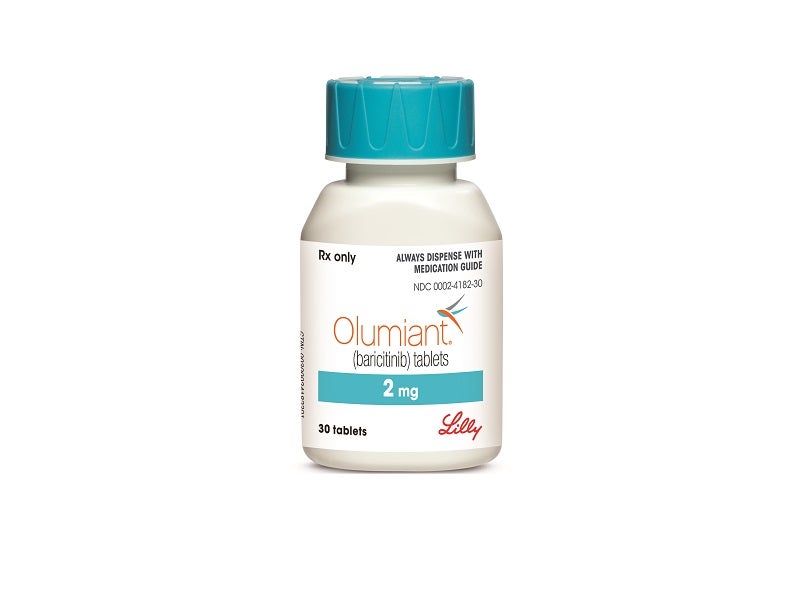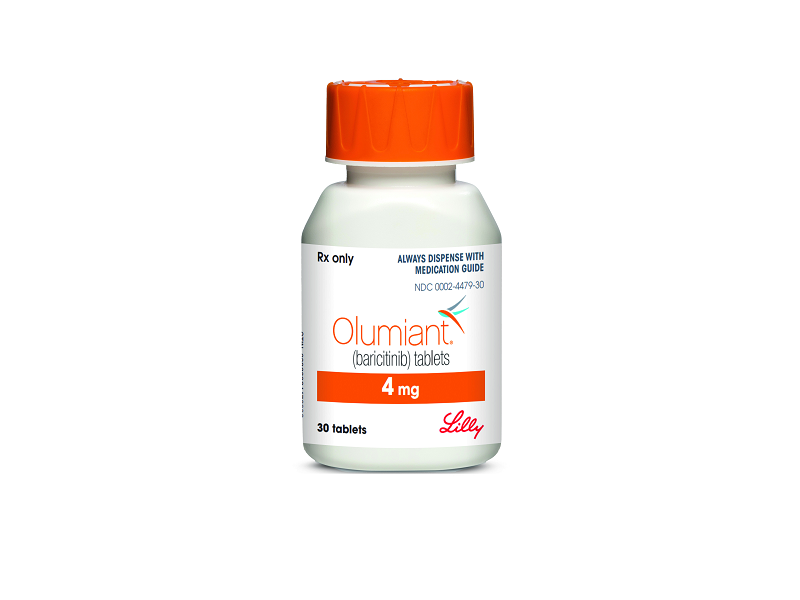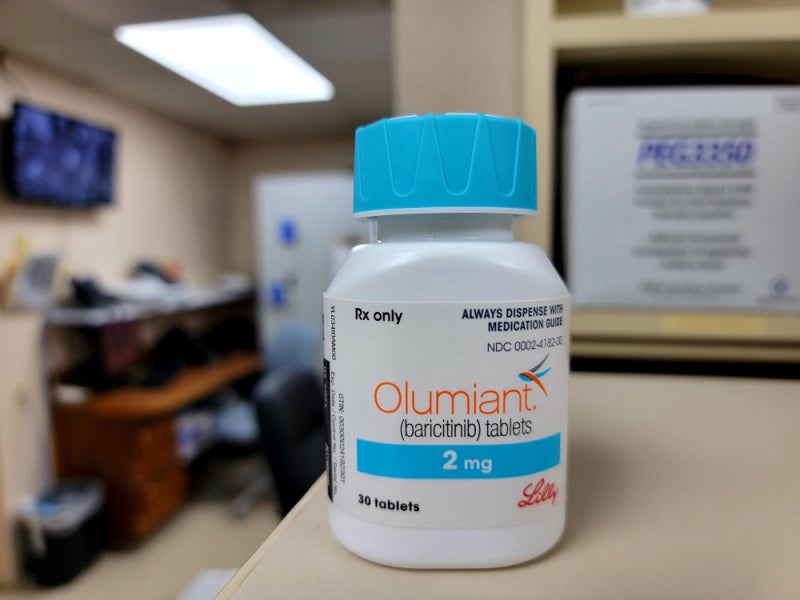Olumiant® (baricitinib) is one of the first once-daily oral selective Janus kinase (JAK) inhibitors approved for the treatment of moderate-to-severe active rheumatoid arthritis (RA), atopic dermatitis, alopecia areata (AA) and Covid-19 in hospitalised adults requiring oxygen support.
Discovered by Incyte, the drug’s development and commercialisation are handled by Eli Lilly under an exclusive worldwide licence and collaboration agreement signed in December 2009.
Under the deal, Incyte received milestone-based and global regulatory payments including $35m for the submission of a new drug application (NDA) and $100m for the drug’s approval.
Olumiant is available as oral, light pink, oblong, debossed, film-coated, immediate-release tablets in 2mg dosage strength. The drug is also available in 1mg and 4mg dosage strengths.
Regulatory approvals for Olumiant
Eli Lilly submitted an NDA for baricitinib to the US Food and Drug Administration (FDA) in January 2016. Olumiant secured the FDA’s approval in June 2018.
Olumiant received marketing authorisation for moderate-to-severe active RA in adults in Europe in February 2017 while Japan’s Ministry of Health, Labour and Welfare granted marketing approval in July 2017. Subsequently, the drug was also approved to treat moderate-to-severe atopic dermatitis in patients who have an inadequate response to topical treatments in the EU and Japan.
The drug has been available in the US under emergency use authorisation since November 2020 for the treatment of Covid-19. In May 2022, Olumiant received FDA approval for the treatment of Covid-19 in certain hospitalised adults requiring various degrees of oxygen support.
Olumiant became the first-in-disease systemic treatment for severe AA with its FDA approval in June 2022. The drug was also given priority review and breakthrough treatment designations for AA.
Rheumatoid arthritis and alopecia areata
RA is an autoimmune disease characterised by inflammation, pain, swelling, stiffness, loss of function and gradual destruction of joints. It can affect any joint, but most commonly affects those in the wrist and fingers. The disease can affect other body parts such as the eyes, mouth, and lungs.
RA often starts in middle age and is most common in older people. Genetics, environmental conditions, and hormone activity are all factors in the likelihood of developing the condition.
Often known as alopecia, AA is an autoimmune illness that causes the body to attack its own hair follicles, causing hair to come out in clumps.
Olumiant’s mechanism of action
Olumiant is a JAK inhibitor that functions by inhibiting the activity of selective JAK1 and JAK2 enzymes, which interfere with the JAK-STAT signalling pathway.
Cytokines play a significant role in regulating cell growth and immune response. They bind and activate type I and type II cytokine receptors, which depend upon the JAK enzymes for signal transduction.
JAK inhibitor drugs prevent the activity of the JAK enzymes and JAK phosphorylate-activated cytokine receptors and block cytokine signalling.
Phosphorylated cytokine receptors produce signal transducers and activators of transcription (STAT) factors, modulate gene transcription, and inhibit immune pathogenesis.
Clinical trials on Olumiant
The NDA for RA indication was submitted to the FDA based on results obtained from the Phase III clinical trial RA-BEACON in December 2014, RA-BUILD in February 2015, RA-BEGIN in September 2015 and RA-BEAM in October 2015.
The FDA’s approval was based on the positive outcomes of the RA-BEACON study.
RA-BEACON included 527 RA patients that showed inadequate responses to traditional disease-modifying anti-rheumatic drugs (DMARDs). The primary endpoint of the study was ACR20 response rates at week 12.
Approximately 49% of patients treated with Olumiant showed higher ACR20 responses compared with 27% of placebo-treated patients. The drug provided early symptom relief after the first week and showed significant improvement in physical function compared with those on a placebo.
RA-BUILD included RA patients that did not show any distinct response to biological therapies. The study included patients that had a defined or no prior treatment with methotrexate and were unaware of other traditional or biological DMARDs.
Aimed at evaluating baricitinib’s safety and efficacy, RA-BUILD enrolled approximately 600 patients that were randomised to one of the three study arms: once-weekly oral methotrexate monotherapy, 4mg once-daily oral baricitinib monotherapy or 4mg once-daily baricitinib in combination with once-weekly oral methotrexate.
The trial demonstrated a non-inferiority of baricitnib monotherapy to methotrexate monotherapy based on ACR20 response after 24 weeks of treatment. Baricitinib was found to be superior to methotrexate based on the ACR20 response.
RA-BEAM was conducted to demonstrate the safety and efficacy of baricitinib along with methotrexate in RA patients, compared with a placebo for 24 weeks or adalimumab for 52 weeks. It enrolled more than 1,300 patients, which were randomised to 4mg oral-once daily baricitinib with methotrexate or a 40mg injectable every other week, adalimumab with methotrexate or a placebo with methotrexate.
The trial demonstrated baricitinib’s superiority over placebo after 12 weeks and 24 weeks based on the ACR20 response in preventing progressive radiographic structural joint damage.
Baricitinib was also found to be superior to adalimumab in demonstrating response and improvement in the DAS28-hsCRP score (disease activity score calculator in RA patients) after 12 weeks. The benefits of treatment with baricitinib were observed and evaluated at 12, 24 and 52 weeks of therapy.
The fifth Phase III study on baricitinib took place in China in 2014. This trial included patients that were naive to methotrexate, inadequate responders to methotrexate, conventional DMARDs or tumour necrosis factor inhibitors.
The results of two randomised, double-blind, placebo-controlled Phase III trials, ACTT-2, and COV-BARRIER, including the COV-BARRIER OS 7 addendum study, supported the FDA approval of the drug for Covid-19 treatment.
The FDA approval for AA was based on the BRAVE-AA1 and BRAVE-AA2 studies, the largest Phase III AA clinical trial programme, in which Olumiant’s efficacy and safety were evaluated in 1,200 adult patients with severe AA.





